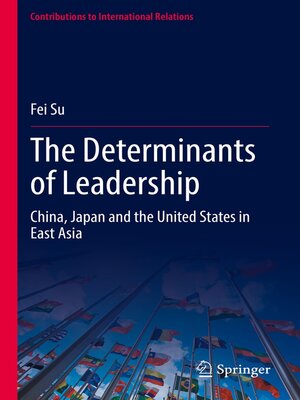The Determinants of Leadership
ebook ∣ China, Japan and the United States in East Asia · Contributions to International Relations
By Fei Su

Sign up to save your library
With an OverDrive account, you can save your favorite libraries for at-a-glance information about availability. Find out more about OverDrive accounts.
Find this title in Libby, the library reading app by OverDrive.



Search for a digital library with this title
Title found at these libraries:
| Library Name | Distance |
|---|---|
| Loading... |
This book investigates the determinants of leadership in East Asia, emphasizing the significance of followership in the success and failure of leadership projects proposed by China, Japan, and the United States. While doing so, it answers a central question in the field of international relations: Why do potential leader countries succeed in obtaining potential followers in some instances, but fail to do so in other instances? Employing an inclusive leadership and societal approach, the book investigates how the leading countries motivate followership in East Asian economic and security dynamics. It analyzes how Chinese, Japanese and American leadership obtained acceptance from potential followers, focusing on the significance of domestic politics of potential follower countries in shaping their governmental preferences and generating followership.
The book features empirical evidence in six case studies, covering topics such as the successful Chinese endeavor of South Korea joining the Chinese initiative for the Asian Infrastructure and Investment Bank (AIIB), the failed US attempt to prevent South Korea from doing so, the US's success to convince Japan to join the Trans-Pacific Partnership (TPP), the failed Japanese strive for winning South Korea's support for Japan's bid for a permanent seat at the UN Security Council (UNSC), the Chinese failure at obtaining the Philippines' backing of the Chinese aspirations in the South China Sea (SCS) during the Aquino Presidency, and, finally, the Chinese success one the same effort during the Duterte presidency.
The book will appeal to students, scholars, and researchers of international relations interested in a better understanding of leadership determinants in East Asia, Global Power Shift, foreign policy, as well as East Asian economic and security dynamics.
The book features empirical evidence in six case studies, covering topics such as the successful Chinese endeavor of South Korea joining the Chinese initiative for the Asian Infrastructure and Investment Bank (AIIB), the failed US attempt to prevent South Korea from doing so, the US's success to convince Japan to join the Trans-Pacific Partnership (TPP), the failed Japanese strive for winning South Korea's support for Japan's bid for a permanent seat at the UN Security Council (UNSC), the Chinese failure at obtaining the Philippines' backing of the Chinese aspirations in the South China Sea (SCS) during the Aquino Presidency, and, finally, the Chinese success one the same effort during the Duterte presidency.
The book will appeal to students, scholars, and researchers of international relations interested in a better understanding of leadership determinants in East Asia, Global Power Shift, foreign policy, as well as East Asian economic and security dynamics.







